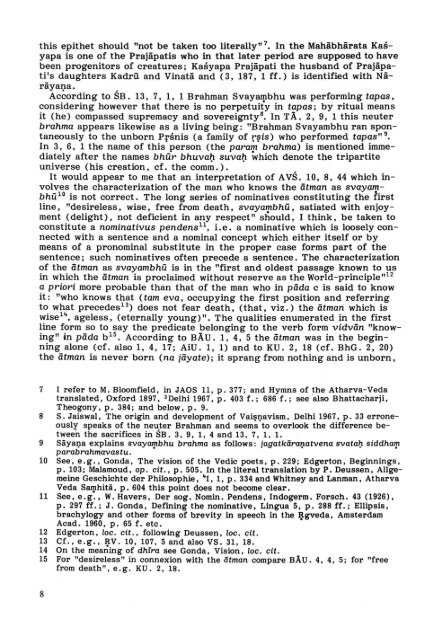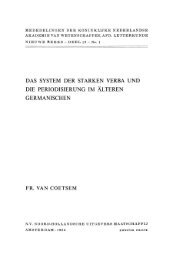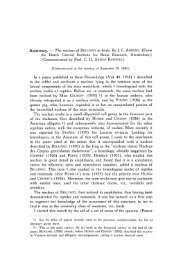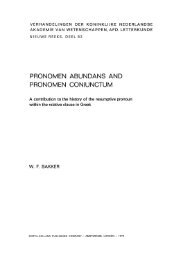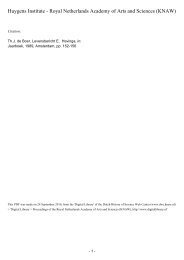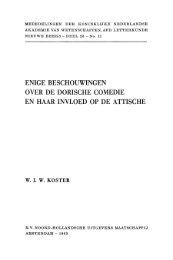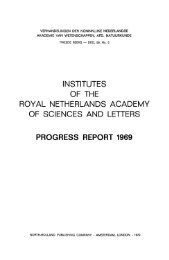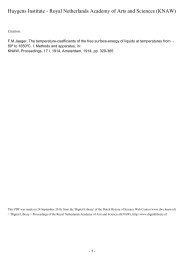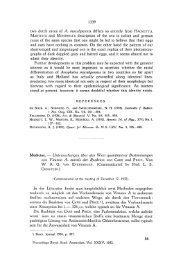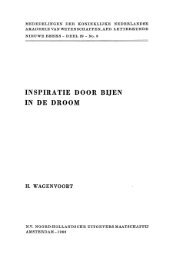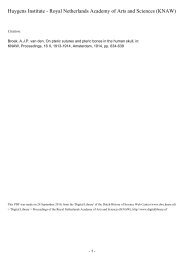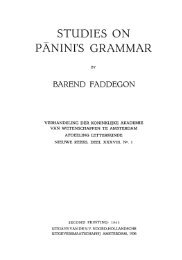Prajapati's relations with Brahman, Brhaspati and Brahma - DWC
Prajapati's relations with Brahman, Brhaspati and Brahma - DWC
Prajapati's relations with Brahman, Brhaspati and Brahma - DWC
You also want an ePaper? Increase the reach of your titles
YUMPU automatically turns print PDFs into web optimized ePapers that Google loves.
this epithet should "not be taken too literally" 7. In the Mahäbhärata Kasyapa<br />
is one of the Prajäpatis who in that later period are supposed to have<br />
been progenitors of creatures; Kasyapa Prajäpati the husb<strong>and</strong> of Prajäpati's<br />
daughters Kadrü <strong>and</strong> Vinatä <strong>and</strong> (3,187,1 ff.) is identified <strong>with</strong> Näräyal)a.<br />
,<br />
According to SB . 13, 7, 1, 1 <strong><strong>Brahma</strong>n</strong> Svayambhu was performing tapas,<br />
considering however that there is no perpetuity in tapas; by ritual means<br />
it (he) compassed supremacy <strong>and</strong> sovereignty 8. In TA. 2, 9, 1 this neuter<br />
brahma appears likewise as a living being: "<strong><strong>Brahma</strong>n</strong> Svayambhu ran spontaneously<br />
to the unborn Prsnis (a family of r~is) who performed tapas,,9.<br />
In 3, 6, 1 the name of this person (the paral'Jl brahma) is mentioned immediately<br />
af ter the Ilames bhür bhuvaQ suvaQ which denote the tripartite<br />
universe (his creation, cf. the comm.).<br />
It would appear to me that an interpretation of A VS. 10, 8, 44 which involves<br />
the characterization of the man who knows the iitman as svayambhü<br />
lO is not correct. The long series of nominatives constituting the first<br />
line, "desireless, wise, free from death, svayambhü, satiated <strong>with</strong> enjoyment<br />
(delight) , not deficient in any respect" should, I think, be taken to<br />
constitute a nominativus pendens ll , Le. a nominative which is loosely connected<br />
<strong>with</strong> a sentence <strong>and</strong> a nominal concept which either itself or by<br />
means of a pronominal substitute in the proper case forms part of the<br />
sentence; such nominatives of ten precede a sentence. The characterization<br />
of the iitman as svayambhü is in the "first <strong>and</strong> oldest passage known to us<br />
in which the iitman is proclaimed <strong>with</strong>out reserve as the World-principle,,12<br />
a priori more probable than that of the man who in piida c is said to know<br />
it: "who knows that (tam eva, occupying the first position <strong>and</strong> referring<br />
to what precedes l3 ) does not fear death, (that, viz.) the iitman which is<br />
wise l 4, ageless, (eternally young)". The qualities enumerated in the first<br />
line form so to say the predicate belonging to the verb form vidviin "knowing"<br />
in piida bIS. According to BAU. 1, 4, 5 the iitman was in the beginning<br />
alone (cf. also 1,4,17; AiU. 1, 1) <strong>and</strong> to KU. 2, 18 (cf. BhG. 2, 20)<br />
the iitman is never born (na jiiyate); it sprang from nothing <strong>and</strong> is unborn,<br />
7 I refer to M. BIoomfield, in JAOS 11, p. 377; <strong>and</strong> Hymns of the Atharva-Veda<br />
translated, Oxford 1897, 3Delhi 1967, p. 403 f.; 686 f.; see 'also Bhattacharji,<br />
Theogony, p. 384; <strong>and</strong> below, p. 9.<br />
8 S. Jaiswal, The origin <strong>and</strong> development of Vai!?l.lavism, Delhi 1967, p. 33 erroneously<br />
speaks of the neuter <strong><strong>Brahma</strong>n</strong> <strong>and</strong> seems to over look the difference betweeD.<br />
the sacrifices in SB. 3, 9, 1, 4 <strong>and</strong> 13, 7, 1, 1.<br />
9 SäyaI}.a explains svaya'!1bhu brahma as follows: jagatkärar;tatvena svata~ siddha'!1<br />
parabrahmavastu.<br />
10 See, e.g., Gonda, The vision ofthe Vedic poets, p. 229; Edgerton, Beginnings,<br />
p. 103; Malamoud, op. cit., p. 505. In the literal translation by P. Deussen , Allgemeine<br />
Geschichte der Philosophie, ~I, 1, p. 334 <strong>and</strong> Whitney <strong>and</strong> Lanman, Atharva<br />
Veda Sarphitä, p. 604 this point does not become clear.<br />
11 See, e.g., W. Havers, Der sog. Nomin. Pendens, Indogerm. Forsch. 43 (1926),<br />
p. 297 ff.; J. Gonda, Defining the nominative, Lingua 5, p. 288 ff.; E llip sis ,<br />
brachylogy <strong>and</strong> other forms of brevity in speech in the IJgveda, Amsterdam<br />
Acad. 1960, p. 65 f. etc.<br />
12 Edgerton, loc. cit., following Deussen, loc. cito<br />
13 Cf., e.g., IJV. 10, 107, 5 <strong>and</strong> also VS. 31, 18.<br />
14 On the meaning of dhïra see Gonda, Vision , loc. cito<br />
15 For "desireless" in connexion <strong>with</strong> the ätman compare BÄ V. 4, 4, 5; for "free<br />
from death" , e.g. KV. 2,18.<br />
8


